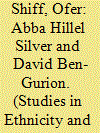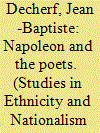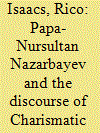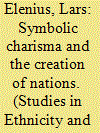|
|
|
Sort Order |
|
|
|
Items / Page
|
|
|
|
|
|
|
| Srl | Item |
| 1 |
ID:
104194


|
|
|
|
|
| Publication |
2010.
|
| Summary/Abstract |
During the years immediately preceding Israel's founding, Abba Hillel Silver was considered the most powerful leader of American Zionism. His leadership was viewed by numerous admirers as epitomising the yearning of the Jewish people after the Holocaust. However, almost immediately after Israel's foundation, he was relegated to the margins of Zionist politics; the more important reasons for this development being his status vis-à-vis the leader of the pre-state Jewish community, David Ben-Gurion, who was elevated to the revered status of the 'founding father' of the recently established state. This article discusses how Silver coped with this new situation, where only his great rival could legitimise him. After realising the futility of challenging Ben-Gurion directly, Silver decided to elevate Ben-Gurion in his speeches to the status of the ideal philosopher-king. The question is whether by doing so Silver accepted the incontestability of Ben-Gurion's charismatic leadership, or whether he was merely attempting to reinterpret Ben-Gurion's new revered status in a way that legitimised his own Diaspora leadership, thus reinforcing a very different national ideology from the Israelocentric one represented by Ben-Gurion.
|
|
|
|
|
|
|
|
|
|
|
|
|
|
|
|
| 2 |
ID:
104190


|
|
|
|
|
| Publication |
2010.
|
| Summary/Abstract |
This article uses Max Weber's analysis of charisma to differentiate types of symbolic places. Although Weber did not include the role of space in his analysis of charisma, we can construct different types of spatial charisma based on his distinction between traditional and bureaucratic regimes. Heritage sites and monuments are used by traditional regimes to legitimise their rule by looking back to their charismatic origins, while futuristic places are used to convince the population that bureaucratic regimes will provide a brighter future. In reality these ideal types of charismatic places are almost always mixed. Nation-states combine both types of charismatic places. The analysis of the Zeche Zollverein in Essen, Germany shows that the meaning of a place can change and incorporate both types of spatial charisma at the same time and place. This was the consequence of a deliberate policy to legitimise a new economic regime in Germany's Ruhr area.
|
|
|
|
|
|
|
|
|
|
|
|
|
|
|
|
| 3 |
ID:
104193


|
|
|
|
|
| Publication |
2010.
|
| Summary/Abstract |
Early nationalist thought in nineteenth-century Iran emphasised the lost glories of the Zoroastrian pre-Islamic past, which it held for a utopian society of refinement, progress, and power destroyed by the advent of Islam. This article aims to show the prominence of this archaistic movement in the early phase of Iranian nationalism by highlighting the impact of an Indian Parsi traveller named Manekji Limji Hataria on nationalist intellectuals. Because of his religious background as a Zoroastrian, Manekji came to be perceived as an emissary of Iran's Golden Age. Fully aware of the potential influence this perception granted him, Manekji endeavoured to disseminate neo-Zoroastrian, pre-Islamic-centred, and frankly anti-Arab/anti-Islamic readings of history among intellectuals, and thus succeeded in having a disproportionate influence on the nationalist definition of Iranian history and identity.
|
|
|
|
|
|
|
|
|
|
|
|
|
|
|
|
| 4 |
ID:
104199


|
|
|
|
|
| Publication |
2010.
|
| Summary/Abstract |
The article evaluates the life and work of N. F. S. Grundtvig as a charismatic leader who played and continues to play a highly significant role in shaping the national life of Denmark. Grundtvig was a Lutheran clergyman and an important writer of hymns, songs, and poetry. Though a key figure in Denmark, he was something of an outsider and prophet in his life and work. Through his public speaking, he challenged Denmark in a time of territorial loss, cultural weakness, and constitutional change to define its identity, to find strength, and to develop fresh approaches to its national life. The article considers his personal gifts and circumstances as factors that led to him becoming a towering figure in nineteenth-century Danish society but argues that his polymath nature and consequent engagement across a range of aspects of Danish society enabled his influence to be embedded deeply in the Danish psyche and life.
|
|
|
|
|
|
|
|
|
|
|
|
|
|
|
|
| 5 |
ID:
104192


|
|
|
|
|
| Publication |
2010.
|
| Summary/Abstract |
The legend of Napoleon has been widely studied by historians; however, little has been written analysing the ways in which this legend brings something new to the history of political ideas. The poets who yielded to a fascination with the dead emperor offered him 'acceptance by his peers', thus creating a typically Romantic new conception of the great man. But Napoleon, as presented by many of the great Romantic writers, was also the object of an extraordinary collective love and enthusiasm. He was, in the words of Balzac, 'the god of the people' (1935, vol. 8: 448). In other words, what is new, in the poets' idealised memory of Napoleon, is the idea of 'extraordinary domination' (Weber), a domination whose mainspring is radically different from that of conventional domination.
|
|
|
|
|
|
|
|
|
|
|
|
|
|
|
|
| 6 |
ID:
104197


|
|
|
|
|
| Publication |
2010.
|
| Summary/Abstract |
Taking a critical perspective on the Weberian concept of charisma this article examines elite and citizen discourse regarding the perceived charismatic leadership and nation-building achievements of the post-Soviet president of Kazakhstan, Nursultan Nazarbayev. Using a number of ideal type features of charismatic leadership based on the typology developed by Roger Eatwell, the article argues that Nazarbayev's leadership does not fit neatly the concept of charisma. Rather, in this instance, Nazarbayev's perceived charismatic leadership as the father of the Kazakhstani nation, and the single politician capable of meeting the challenges of post-Soviet nation-building, is a constructed discursive force projected from above at the elite level, which resonates with public attitudes towards him at the societal level. Charisma represents a discursive mechanism that emphasises President Nazarbayev's centrality to the unity, prosperity, and stability of the nation. This charismatic discourse has aided Nazarbayev in consolidating his authoritarian regime and illustrates the existence of a distinct form of post-Soviet charisma.
|
|
|
|
|
|
|
|
|
|
|
|
|
|
|
|
| 7 |
ID:
104196


|
|
|
|
|
| Publication |
2010.
|
| Summary/Abstract |
This article analyses the relationship between time, charisma, and the personality cult devoted to Nicolae Ceau?escu in communist Romania. It attempts to explore what schemes and devices were used in order to construct his image as a national leader and how time and charisma were dealt with within the process. Ceau?escu was obsessed with both carving a prominent place for himself in the national pantheon and shaping his posthumous image. This involved, first, the construction of his image in historical perspective - Ceau?escu was portrayed as the last and most important in a long lineage of national heroes. Second, it required an emphasis on the relationship between Ceau?escu and the masses. Third, it meant an attempt at mastering time - at delivering an image of Ceau?escu that would survive the passage of time unaltered. By investigating three mechanisms of cult production (stadium celebrations, architectural construction, and the medium of painting) this paper explores the relationship between constructed charisma, the creation of a national hero, and the issue of time within Ceau?escu's personality cult.
|
|
|
|
|
|
|
|
|
|
|
|
|
|
|
|
| 8 |
ID:
104191


|
|
|
|
|
| Publication |
2010.
|
| Summary/Abstract |
This article investigates the ways in which South American shamanism might be analysed in terms of the Weberian concept of charisma, and to ask what is at stake in doing so. It is suggested that this problem might be more rigorously approached by way of a detour through Weber's account of disenchantment, which poses questions about the theological heritage with which our contemporary philosophical and methodological thought is interwoven, and about the particularity of that heritage. As a consequence, it is suggested that contemporary modulations of shamanism can productively problematise customary accounts of the meaning and structure of charisma and of the ways it must be thought to relate to politics in modernity.
|
|
|
|
|
|
|
|
|
|
|
|
|
|
|
|
| 9 |
ID:
104201


|
|
|
|
|
| Publication |
2010.
|
| Summary/Abstract |
The cultural charisma of the Sámi people has served to inscribe them in the nation myths of the Scandinavian states. This charisma was also built into the self-image of the Nordic countries when they established as a political organisation in the 1950s. While this charisma was to some extent created by leaders of the majority population, its symbolic value has also been used by the Sámi movement as a tool for political mobilisation. The global resistance by indigenous people towards colonialism resulted in a shift of the Sámi people's strategy from national to global action, and in the redefinition from a 'nature people' within the nation-state to an 'indigenous people' in a global legalistic discourse. At the same time, Sámi politicians strive to unite the different Sámi groups through a common homeland, Sápmi, which crosses the nation-state borders. The political territory of Sápmi can culturally be regarded as an imagined nation in the same way as a nation-state, even if it is scattered across four countries. The creation of a Sámi nation also faces the same kind of inter-ethnic problems as the nation-state.
|
|
|
|
|
|
|
|
|
|
|
|
|
|
|
|
|
|
|
|
|